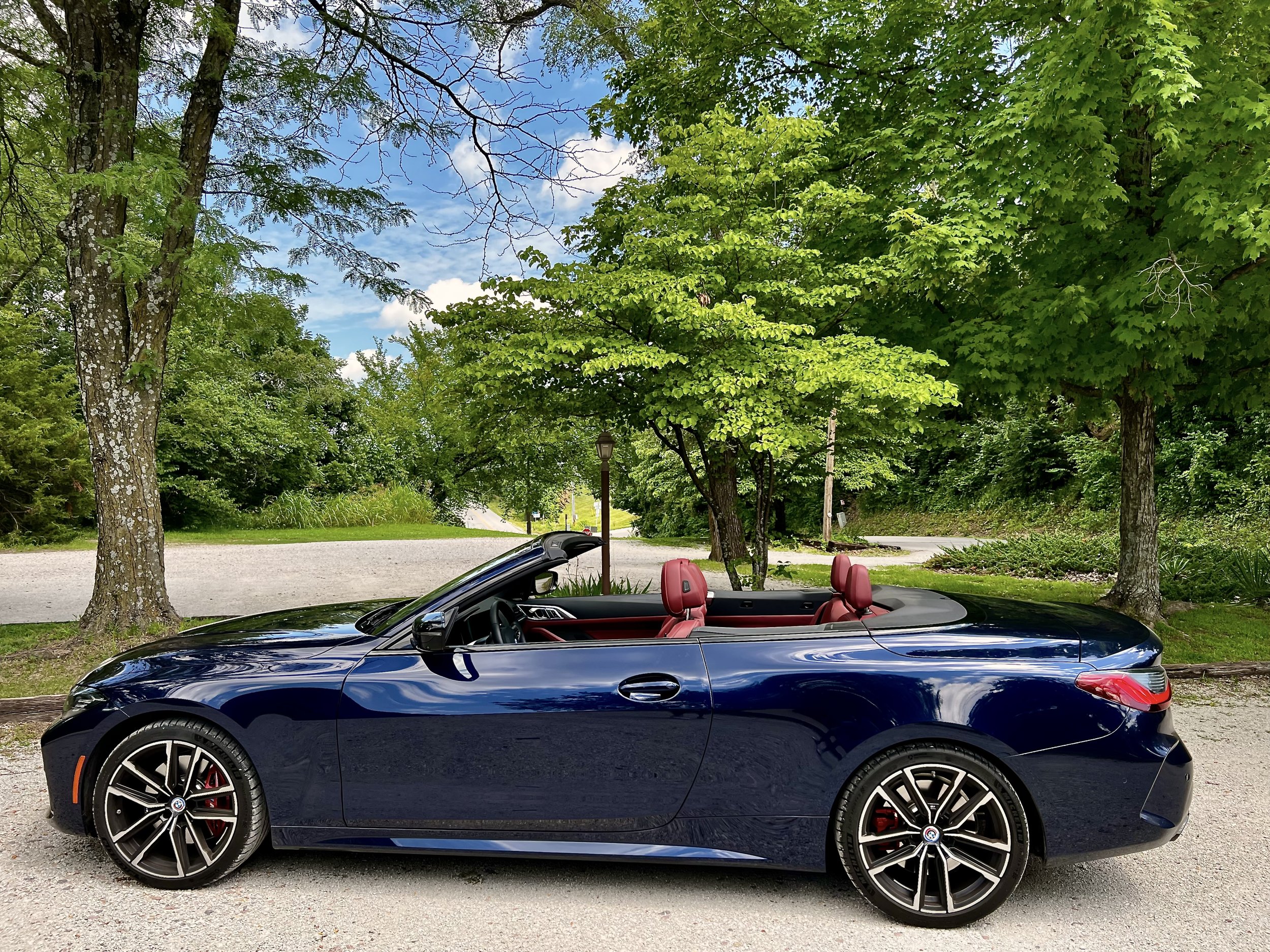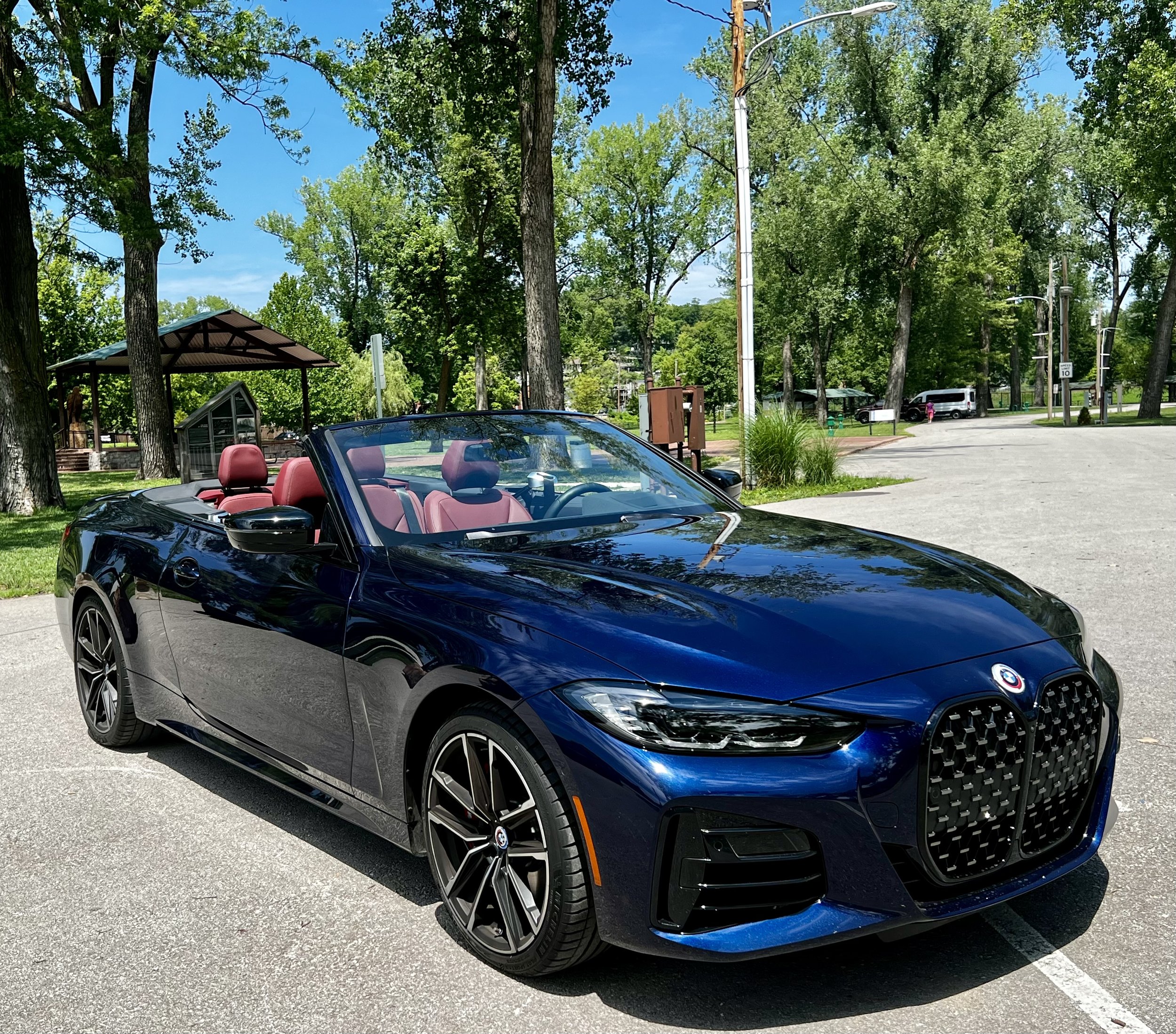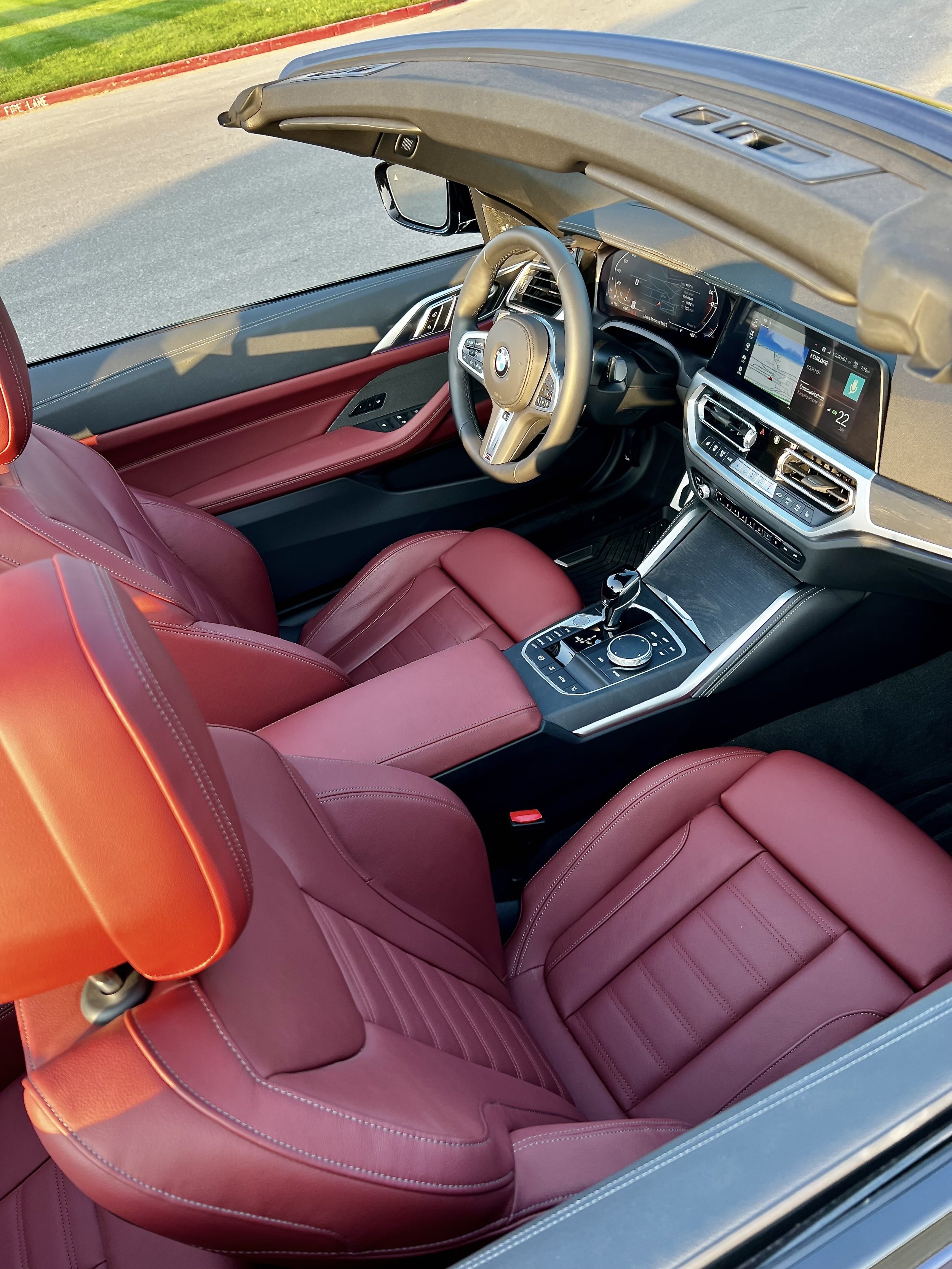(This piece also appeared on BMWBLOG on July 30th, 2023. You can check it out here.)
Let’s get this out of the way first: I dig this car’s grill. More on that later.
The car you see here is a 2023 BMW M440i xDrive Convertible, BMW’s just-below-an-M, mid-sized, open-aired joy machine. (And since BMW’s contemporary vehicle nomenclature can be a bit of a mouthful, we’ll just call this one the “M440i”.) In BMW parlance, this example is the second-generation of the 4-series platform, code G20/G22/G23 for the intelligentsia (the convertible is the G23) and was first released in mid-2020 as the first significant update to the 4-series platform (code F32/F33/F36) originally launched in 2014. Notably, the G23-model convertible BMW moved away from the previous folding hardtop to a more classic multi-layered soft top design, an aesthetic and functional return to the past that, to this reviewer’s mind, is an improvement is every way.
Assembled like all 4-Series cars at BMW’s plant in Dingolfing, Germany, this particular M440i is loaded with numerous goodies from the BMW options list, including the Dynamic Handling Package, Parking Assistance Package, Adaptive M Suspension, and gorgeous BMW M 50-Years Roundel. It’s painted a lustrous color BMW calls Tanzanite Blue II Metallic, a stunning, deeply shimmering base for any-and-all fingerprints, with the interior in Tacora Red Vernasca Leather, which reads closer to a French Burgundy color than a true red. It’s an elegant, timeless combo on this car, and immensely popular with pedestrians and other drivers, given the number of compliments I’ve received while tooling around. The MSRP on this car, with its robust list of goodies, was $77,765.
The convertible’s fabric convertible roof weighs roughly 40% less than the previous generation’s rigid folding top and takes only 18-seconds to open and close (which can also be done at speeds up to 31-mph, handy for those “first drops of rain” moments). The frame of the top uses large panel-bow elements with honeycomb construction for lightness and rigidity and features a flush-sitting glass rear window with full defrost. The top is extremely quiet, allows for a sleeker coupe profile, and increases trunk space from the previous generation, with 9.0-cubic/ft of storage space and a pass-through for longer items.
As with most 4-seat convertibles, the M440i is fitted with a manual wind deflector to quiet turbulence in the cabin, and the deflector comes with its own cargo bag to store in the cabin. While it’s simple to fit and certainly works as designed, in practice it’s a bit of a chore to install and most drivers will either leave it in place (hello, Florida or Arizona) or rarely if ever fit the device at all (hello, the rest of the world). A permanent, powered wind deflector for a 4-seat convertible remains one of the engineering holy grails it seems.
Inline-6 for the Win
BMWs are righty lauded for their Inline-6 motors, the configuration that’s been the marque’s calling card for generations of cars. (With a few oddballs thrown in; I still get misty thinking about the bespoke V8 in the E92 generation of M3 cars.) This iteration is a worthy addition to that legacy. Codenamed B58, this motor is a 3.0-liter twin-scroll turbocharged inline-6, which began production in 2015. The water-to-air intercooler is integrated into the intake plenum, and the engine is equipped with both of BMW’s “killer-V” technologies (Double Vanos, aka variable valve timing, and Valvetronic, aka variable valve lift). At 7000rpm, the B58 makes 382-hp and 369-ft/lbs of torque from 1800rpm onwards.
Power is put down through the ubiquitous ZF-sourced 8-speed automatic transmission, and in this car’s case, BMW’s available xDrive AWD system coupled to an M-Sport differential and suspension. (And while I, like most enthusiasts, would love the option of a manual, this car’s personality is well flattered by the ZF.) Performance is impressive. The car launches from 0-60mph in 4.7-sec according to BMW, who is known for conservative official performance numbers. Other instrumented road testers have measured the same acceleration as 4.1sec for the 0-60 sprint, and some have measured even quicker to that. Suffice it to say it scoots and is even quicker than the aforementioned V8-powered M3.
The Nose Knows
Now, about that front grill. Recently, more angst-ridden sentences have been written about the large kidney grill on the 4-series than tears shed at the Hatch Chile Eating Contest, but what many reviewers and casual observers fail to note is the historical context of the design. Much of the howling distills down to one errant point: How could BMW dilute the elegance of the classic kidney grill to such a degree? But this fails even the most basic contextual observation, that being that there is literally no single benchmark shape of the kidney grill design over time.
BMW 328, running at the Mille Miglia
Witness, for example, one of the most classic of all BMWs, the 1930s-era 328. It’s a stunning design by any measure, held in esteem by Bimmer fans everywhere. And one that also has a huge grill that spans the entire vertical width of the vehicle. Precedent! (Also, anyone who glimpsed the luscious 328 Hommage Concept from 2011 shouldn’t have been surprised when the double-height grill made another appearance.)
For a quick primer on kidney grill shapes over the years, BMW provides an excellent guide: “The BMW Kidney Grille Through Time.” From the 503 to the M1 to the E9 CS to the i3 to the XM to the current-generation 4-series, there exists a wonderful variety of kidney grille shapes and sizes for almost the past one hundred years of BMW design. And with even a cursory glance at the current lineup of BMWs on today’s market, it’s clear we’re living in a golden age of BMW grill shapes. Do I love them all? No. Am I delighted there’s such variety? Absolutely.
All that said, ultimately design and aesthetics is down to the eye of the beholder, and to my eye, the 4-series design is elegant, dramatic, and proportional. (And the hood scallops on the M3/4 models make it even more so.) Most of all, it’s distinctive; there’s no doubt what model you’re seeing when you see a 4-series from the front.
When is an M-car Not an M-car?
The M-Performance designation of BMW’s has also caused relative Sturm und Drang amongst the aficionados, who view any “dilution” of the M-brand as heresy to be handled with Bastille Day fervor. But this reviewer thinks BMW did an immense service to lovers of well-balanced performance cars everywhere by creating this “almost-M” line of engines and suspensions.
Perhaps this will get me excommunicated from BMWBLOG, but I find most contemporary M-cars to be almost too punishing and challenging to drive on most normal roads (especially those in the US, which tend towards broken pavement and a patchwork of materials), not to mention with levels of engine power that are impossible to access in any manner short of felonious or irresponsible. Enter the M-Performance series of vehicles. With power levels that aren’t obscene and suspension tuning that trends towards the more compliant, the M-Performance range live in a Goldilocks Zone between largely pedestrian and over-the-top.
For example, this M440i convertible. Regardless of how you spin it, a convertible of this type tends towards the GT side of the automotive continuum, rather than as a pure sports car (BMW offers the Z4 for that). While the M4 Convertible is an utter hoot, it can be a bit harsh, and if you’re really flogging it to get at what makes it so special, the topless nature of the car exposes compromises in both stability and passenger comfort that just don’t make much sense. You don’t buy a car like this to be beaten up; you buy a car like this for the serenity and joy of wafting along in open air, the sights and smells of the environment blending with the tactility of the car for that special driving pleasure experience. The overall M-Performance package absolutely delivers. It’s likely more car than you’ll ever need but provides just the “right amount of that much more” that you’ll really want.
Top-Down Bonus Ratio
A few years back, when I reviewed the M235i xDrive Convertible, a friend stuck his nose in a spreadsheet, did some fancy cyphering, allegedly had a cocktail or two, and calculated that each day of top-down driving was worth 6.4-days of driving with the top up, for a ratio of 6.4:1. With this M440i convertible, I’d likely revise that to be an even higher ratio, as the enjoyability of this car (top up or down, honestly) is immense. The engine starts with an appealing little bark, then settles down to a tensioned smoothness at idle, which builds quickly (with the usual modern turbocharged flatulence) in all gears. The transmission’s Sport setting is your exuberant friend for most daily chores and has the added benefit of disabling the Auto Start/Stop system; there’s no dedicated button to do that, as in full-M models. (Though in fairness, the Start/Stop system in this car is almost transparent, thanks to the 48v mild-hybrid system that smoothly relights the engine with even the gentlest lift from the brake pedal when at a standstill.)
Recently, on a drive from West-Central Missouri down through the wonderfully twisting (and newly paved) Ozark roads in and around Bentonville, Arkansas, I had an opportunity to really flog the car a bit. Handling is precise and direct, with little of the dead-on-center feel of the last couple of generations of BMW 3- and 4-series cars. Steering response isn’t as leisurely as on non-M-Performance models, but also not as darty as on contemporary full-M models. That Goldilocks Zone is very much in play here.
As with all M-Performance models, the M440i lets you choose between several drive modes to tune the car’s overall feel. These modes are accessed through four buttons on the center console, labeled Sport, Comfort, Eco Pro, and Adaptive. Each mode is distinctive, but after living with the car a bit, I settled on Adaptive with the transmission in Sport mode as my typical setting, to bring the car alive but not in a harsh way. Serenity is the point of cars like this.
Cowl shake over lousy pavement or railroad tracks is barely noticeable, and the difference in rigidity between the convertible and the hard-top model is negligible and more than outweighed by the bonus of being out in the world. That said, I’m a fan of convertible cars in general and thus I’m clearly in BMW’s target market here, but even for those who wouldn’t normally gravitate to topless versatility, the gap between the coupe and convertible in terms of driving dynamics seems minimal.
The Living is Easy
As a flexible GT car that offers the distinctive benefit of letting you literally smell the roses and work on that always-fetching wind-blown look, the M440i xDrive Convertible is a well-resolved and engaging package. It’s planted on the road, powerful, and comfortable, and has a shape and presence that sets it apart from other mid-sized, 2+2 convertibles on the road (admittedly a small class). A day wafting along behind this steering wheel is time well spent indeed. For those looking for a versatile and capable premium convertible, it should be at the top of the wish list.




